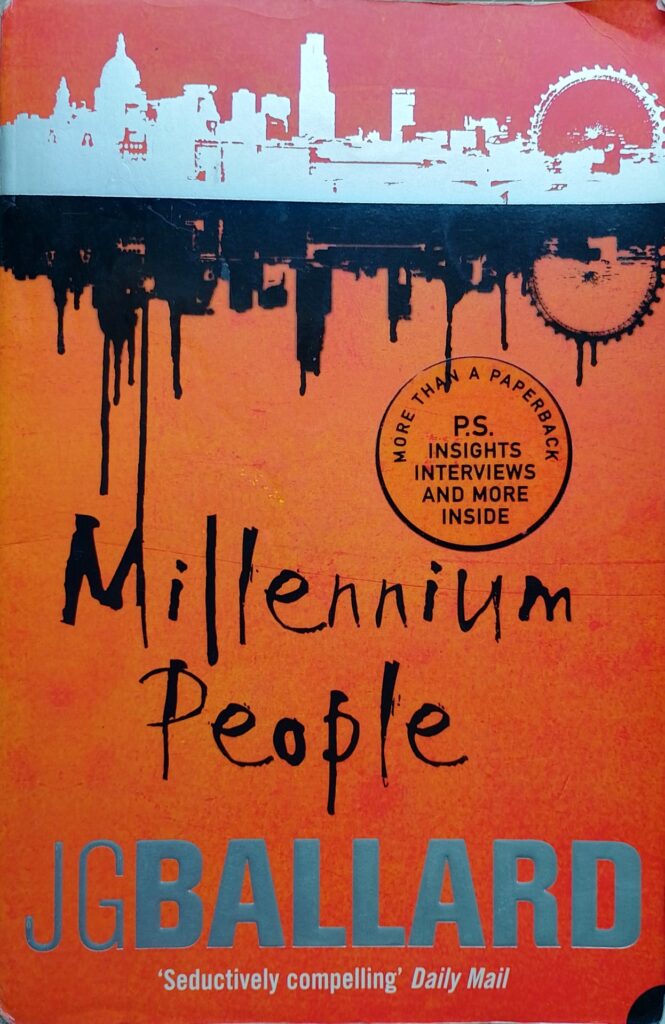First published 2003. Harper Perennial paperback, 2004, pp 294, c.88,000 words.
This can be seen as a mash-up of previous Ballard books: The middle-class rebellion against the consumer/capitalist/rat-race society from High Rise, the charismatic but bonkers woman from Rushing to Paradise, and with a touch of the psycho-sexual energy linked to violence from Crash. These are all elements that reoccur in Ballard’s late fiction. While the big themes are unoriginal to Ballard’s body of work, what also remains in the quality of Ballard’s writing. It is always a pleasure to be immersed in his slightly hazy but rich prose, drifting along in a slightly intoxicated, dry, witty and distinctly unhinged world. All the characters are recognisable as real middle-class types, but all are amped up, some just with minor idiosyncrasies, some of who are definitely certifiable.
The story opens to a flash-forward to the conclusion of what has clearly been a riot in Chelsea Marina, a new gated-development on the fringe of fashionable London (modelled on Chelsea Harbour), a place inhabited by middle middle-class professionals, struggling to keep up high-end life-styles. This scene is being visited by the protagonist, David Markham ‘a trained psychologist’ [p3]. Markham rather enjoys himself too much to see what is going on until long after the reader. It is a very clever conceit and a sly dig at Markham’s profession. He has been ‘infiltrated into Chelsea Marina as a police spy – a deception I was the last to discover’ [p3].
Markham’s world is one of casual relationships: people marry but divorce when bored, or have open-marriages that condone extramarital affairs by both partners. These people have first-world problems and are trying to work out their dissatisfaction with their easy lives in all kinds of ways. It is a world of equality between men and women: each can have economic and sexual power, intelligence and energy, rational and irrational behaviour.
The story explores a growing level of violence, and of different forms of insurrection. At the lowest end there are petitions and protest marches, then refusal to pay bills and taxes, followed by petty vandalism and shop-lifting, rising through arson and street riot, destruction of property and cultural heritage, and on up to murder. Each of us has to choose what is an acceptable level of protest and rebellion in a particular circumstance, and presumably Ballard’s aim is to expose his middle-class readers to these questions by making them the actors in revolution. Markham pretends to be naïve in unwittingly assisting the leaders of the revolt, but is he not really revelling in the excitement? Isn’t that one of the drivers of humanity into war: an escape from the tedium of mundane conformity in the plodding reality of the everyday in peacetime?
Ballard is a master of the put-down, the satirical aside, the skewering of middle-class behaviours, pretensions, and snobbery. Often these are very funny, e.g.: about a children’s play ‘It’s sweet, but a total bore. Snow White rewritten by Harold Pinter.’ [p50]. ‘As always, a perverse calculus refreshed and redefined the world’ [p73], ‘as if waiting for the [Millenium] Wheel to turn, a machine from a painting by Bosch, grinding out time and death’ [p141], ‘Martyrdom waited in the wings of her ambition, ready to bestow stardom’ [p151], ‘they planned to invade the news studio and broadcast the manifesto of middle-class rebellion to the listening nation, mouths agape over their muesli’ [p155], ‘but no lover would ever equal the allure and sensual potency of primed Semtex’ [p188], ‘It undermines morale, breaks the chains of envy and rivalry that hold everything together’ [p193], ‘and the council street cleaners, traditional working class to the core, refused to enter the estate, put off by the menacing middle-class air’ [p198], ‘the outrage of professional men and women who had never known pain and whose soft bodies had been pummelled only by their lovers and osteopaths’ [p203], ‘an elderly solicitor and archery enthusiast, held two Molotov cocktails, burgundy bottles filled with petrol into which he had stuffed his regimental ties’ [p224], ‘The inspector shook his head in despair, but he had reckoned without the long-engrained ruthlessness of the middle class towards its own children’ [p226].
Ballard has a love for certain ‘woody’ words like nimbus, ectoplasm, incubus, etc. and, as can be seen from the examples above, his prose is rich. Nevertheless, this is highly readable.
While this might not add anything to Ballard thought, it is a hugely entertaining and beautifully written trip into a very slightly-alt present, which should make us at least pause over our muesli.
Wikipedia biography of Ballard: https://en.wikipedia.org/wiki/J._G._Ballard
Wikipedia summary of the book: https://en.wikipedia.org/wiki/Millennium_People
Others’ reviews of the book: https://www.goodreads.com/book/show/12885844-millennium-people?from_search=true&from_srp=true&qid=nteCOtW7ZY&rank=1
© William John Graham, November 2023

